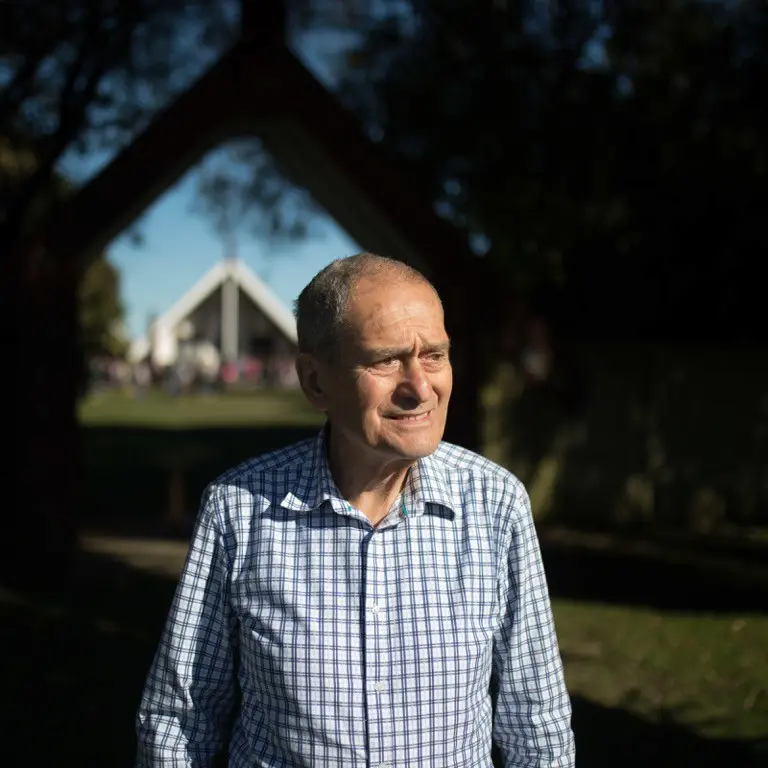Sir Mason Durie
Emeritus Professor of Maori Research and Development at Massey University.
Sir Mason Durie is an exceptional academic and a highly-regarded leader in public and indigenous health, wellbeing and education. A man who has worked tirelessly to improve the outcomes and futures of Maori, and who continues to dedicate his life to making a better New Zealand for all of its people.
The 2017 Blake Medallist, Sir Mason Durie, has made a lifelong commitment to making a difference in the health and wellbeing of New Zealanders, and ensuring that Maori play a significant part in the future of New Zealand.
Sir Mason is one of the country’s most respected academics, and an outstanding contributor to public, indigenous, and mental health.
While most of his career, spanning almost half a century, has been focused on improving Maori health outcomes, he has also garnered huge respect for championing higher education for Maori. His philosophies around Maori wellbeing have influenced a generation of policymakers, politicians and, in turn, the education, health and social sectors.His work has had a significant influence on those on the frontline of New Zealand health services delivering care.
The model he created for healthcare, Te Whare Tapa Wha, successfully challenged the notion that health is the same for people of all cultures. He has also made significant strides with his work in mental health, and most recently, the prevention of suicide in Maori and Pasifika communities.
Born in 1938, of Rangitane, Ngāti Kauwhata and Ngāti Raukawa descent, Sir Mason grew up in Feilding, where his hard-working parents showed him the importance of a strong work ethic. His paternal grandfather, John Mason Durie, was a highly-respected tribal and community leader, who encouraged Sir Mason and his two brothers to attend the esteemed Te Aute College in the Hawkes Bay.It was there that a young Mason was inspired by two former pupils of the school – Sir Peter Buck and Sir Maui Pomare – the first Maori to train as doctors.He left Te Aute convinced medicine was his future career.
Sir Mason graduated from the University of Otago with a Bachelor of Medicine and a Bachelor of Surgery in 1963, before going on to further study in Canada, where he obtained a Postgraduate Diploma in Psychiatry from McGill University. On his return to New Zealand, he practised psychiatry in the new unit at Palmerston North Hospital. He then became the hospital’s Director of Psychiatry. During this time, Sir Mason saw there was a disconnection between the different elements of conventional clinical health practice. He listened to Maori elders on marae, who emphasised that mind and body could not be separated and that both were linked to culture and relationships with whanau and the environment. Arising out of those insights, in 1982, Sir Mason developed the holistic health and wellness model, Whare Tapa Wha, which was to give Maori a greater sense of ownership of their health. The model presents a Maori view of health and healing in four dimensions – wairua, hinengaro, tinana and whanau; spiritual, mental, physical and family health. Whare Tapa Wha represents health as a house, where all four walls are necessary and must be in balance if it is to be strong.
Sir Mason was appointed to the Royal Commission on Social Policy from 1986-88, an experience that made him even more conscious of the socio-economic determinants of health.
Later in his career, concerned by the growing need for mental health services, Sir Mason helped to create and lead Te Rau Matatini, a national organisation to develop the Maori mental health workforce. In 2014, Te Rau Matatini joined forces with Le Va, its Pasifika equivalent, to create a national suicide prevention programme for their communities, called Waka Hourua. Sir Mason chaired the Waka Hourua leadership group.
In the late 1980s, Sir Mason moved into academia. Determined to make a difference to future generations of Maori, he established and headed Te Putahi-a-Toi, the School of Maori studies, at Massey University. In 2002, Sir Mason was appointed Chair of Maori Research and Development at the university. He was appointed Deputy Vice-Chancellor of Massey University in 2009, serving until his retirement in 2012.
Sir Mason has always championed higher education for Maori. He provided national academic leadership for Maori and indigenous development and regularly assisted iwi and Maori communities to realise their own aspirations for socio-economic advancement. He has been part of a movement to support Maori students through their doctorate studies and encourage more Maori to complete higher degrees.
Closer to home, he is a longstanding trustee for the Aorangi Marae and a founding member of Nga Kaitiaki o Ngati Kauwhata.
Sir Mason’s wife, Arohia, Lady Durie, was a distinguished education professor, who devised New Zealand’s first graduate immersion course in Te Reo. Together Arohia and Mason have been a formidable team, at one in their conviction that Maori can succeed in multiple domains.
Always transfixed by learning, Sir Mason graduated as a Doctor of Literature in 2003.
In his many governance roles, Sir Mason has served on the boards of Te Papa and the Foundation for Research Science and Technology; has been chair of the Guardians Group for the Secondary Futures project, and a Commissioner for the New Zealand Families Commission.
He chaired the Ministerial Taskforce on Whanau Ora – the indigenous health initiative driven by Māori cultural values. He is patron of the Te Potiki National Trust, established in 2007 to support connections between ancestral marae, descendants and visitors.
His efforts have been recognised with many accolades. In 2008, he received an Honorary Doctor of Laws from Otago University and in 2014 an Honorary Doctor of Science from Simon Fraser University, Vancouver. Professor Durie is a Fellow of the Royal Australian and New Zealand College of Psychiatrists, a Fellow of the Royal Society of New Zealand, a Fellow of the Humanities Council of New Zealand Academy, and an Honorary Fellow of the New Zealand College of Public Health Medicine. He has published widely and has regularly presented keynote addresses at Iwi, national and international conferences.
In the 2001 New Year Honours, Sir Mason was appointed as a Companion of the New Zealand Order of Merit For services to Maori. Nine years later, he was appointed as a Knight Companion of the New Zealand Order of Merit for services to Maori health and public health services in particular. Sir Mason remains an Emeritus Professor of Maori Research & Development at Massey University.


